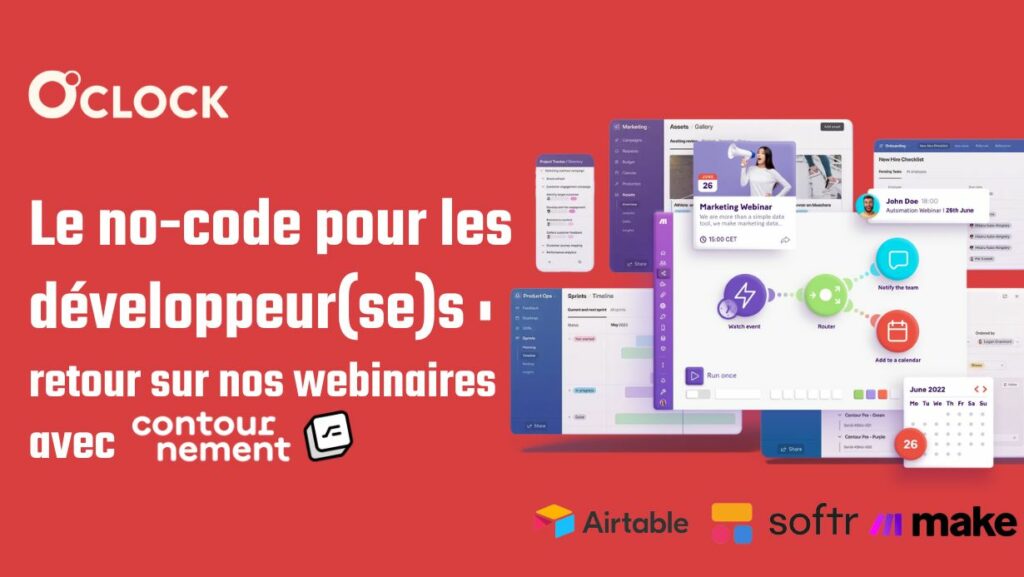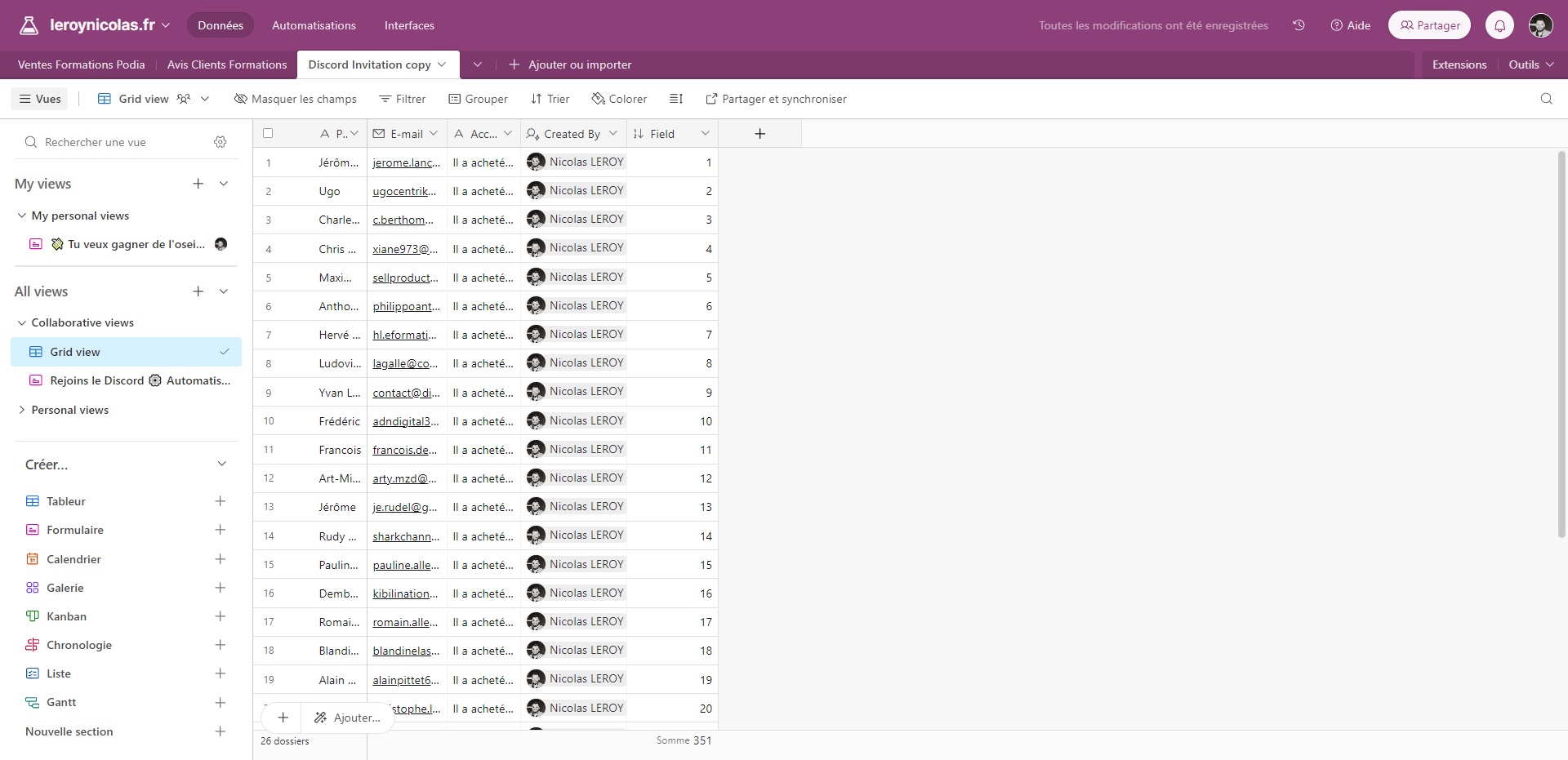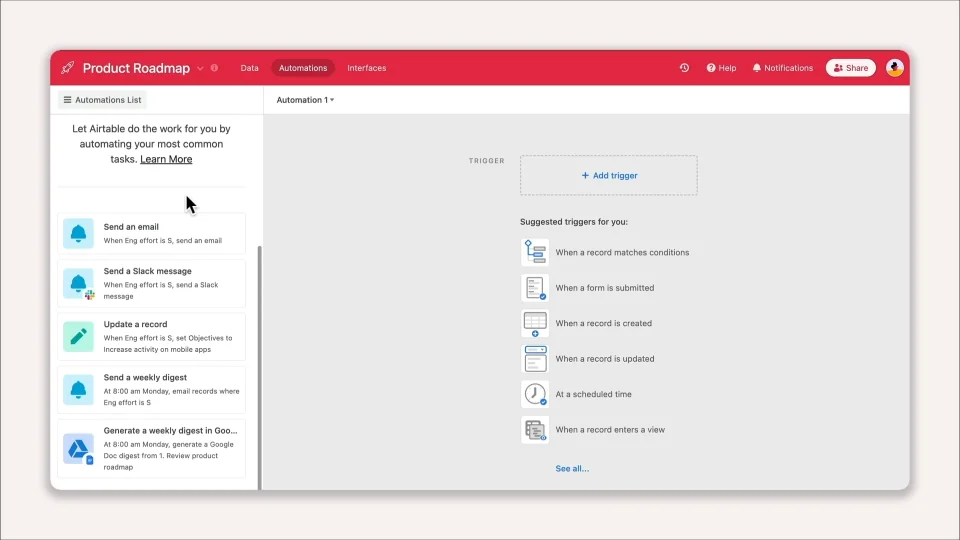Airtable establishes itself as a key player in the field of NoCode project management and database management, redefining the way teams collaborate and organize their information. With its intuitive interface and ability to combine the power of a database with the simplicity of a spreadsheet, Airtable enables its users to design custom solutions without requiring advanced technical skills. Through its innovative approach, it facilitates task visualization, data centralization, and process automation, thus offering unparalleled flexibility to adapt to the diverse needs of modern businesses.
Table of Contents
ToggleAirtable: A New Approach to Project Management

Airtable offers an innovative approach to project management, combining ease of use with flexibility. Unlike traditional project management tools, Airtable allows for organizing information in tables, making data visualization and interaction easier.
This platform is particularly suited for NoCode workflows, allowing users without technical skills to create sophisticated applications. By providing an intuitive interface, Airtable empowers teams and fosters collaboration.
Since database management is essential to many projects, Airtable allows users to create tables, link information, and structure data seamlessly. Users can easily filter, sort, and organize their data without needing to code.
The key features of Airtable include:
- Customizable templates for different types of projects.
- Automation of repetitive tasks to enhance efficiency.
- Integration with tools like Slack and Zapier for seamless application connections.
- Real-time collaboration capability, allowing multiple users to work simultaneously on the same project.
Airtable also stands out for its ability to adapt to different workflows, whether in marketing, project management, or event tracking. This makes it a preferred choice for teams looking to optimize their productivity while being creative.
Indeed, the visual interface of the platform allows for transforming data into dashboards, making performance analysis more intuitive and accessible. The use of different views (kanban, calendar, gallery) adds extra flexibility in presenting information.
Airtable has thus established itself as an essential tool for professionals wishing to effectively manage their projects while relying on NoCode solutions and organized data.
Flexibility and Customization of Tables
Airtable has become an essential tool for NoCode project management. Its unique design enables users to create customized databases while providing an intuitive interface. This greatly facilitates the organization and tracking of various tasks within a project.
The platform is distinguished by its ability to combine flexibility and customization. Each user can modify the tables to meet their specific needs, allowing the tool to be adapted for various types of projects. Whether for task tracking, content management, or customer follow-up, Airtable adjusts easily.
Thanks to its various views, such as the Kanban view, calendar view, or gallery view, each team can choose the presentation that suits them best. This diversity allows for optimizing information management and improving visibility into project progress.
Airtable also offers automation features that simplify daily work. Here are some of the key capabilities:
- Integrations with popular tools like Slack, Google Drive, and Dropbox.
- Automations through rules to reduce manual tasks.
- Pre-designed templates to quickly start with already structured projects.
Furthermore, collaboration is facilitated through the ability to share databases with other users. Each team member can leave comments, cc a collaborator, or even update items in real-time. An essential feature in a dynamically work environment.
Users can also track the performance of their projects using calculation fields and integrated charts. This allows for visualizing data and making informed decisions quickly.
Airtable thus emerges as a comprehensive and adaptable solution for teams wishing to combine technology and project management, thereby enhancing their productivity and efficiency.
Real-Time Collaboration
Airtable revolutionizes NoCode project management by combining the functionalities of a spreadsheet and a database. This platform allows structuring, organizing, and managing projects in an intuitive and visual manner, making the process accessible even to non-technicians. With its user-friendly interface, users can create customized tables tailored to their specific needs while benefiting from unprecedented flexibility.
By integrating elements such as galleries, calendars, and Kanban views, Airtable offers a varied perspective on different aspects of a project. This promotes better visibility and effective management of tasks. Users can thus personalize their experience according to their workflows, optimizing team productivity.
Real-time collaboration is one of Airtable’s major strengths. Team members can work simultaneously on the same project without fear of losing information. This feature enhances communication between departments and improves overall efficiency. Real-time notifications keep users informed of updates instantly, thereby minimizing the risks of discrepancies in collaborative work.
The main features promoting collaboration include:
- Sharing databases with customizable access rights.
- Integrated comments on each task or project to facilitate exchanges.
- Integration with communication tools such as Slack to keep all exchanges in one place.
- Automations to trigger notifications or changes based on specific actions.
Finally, integration with third-party applications, such as Zapier, allows extending Airtable’s capabilities, making project management even more efficient. Teams can link their favorite tools for a seamless and uninterrupted workflow. With this combination of flexibility, collaboration, and integration, Airtable positions itself as a key player in the digital transformation of modern teams.
-
Database Flexibility
Airtable allows for easy customization of data structures according to the specific needs of each project.
-
User-Friendly Interface
Its intuitive interface requires little to no technical skills, making management accessible to everyone.
-
Real-Time Collaboration
Teams can work simultaneously on the same data, enhancing communication and efficiency.
-
Integrated Automations
Airtable offers automations that reduce manual tasks and increase productivity.
-
Predefined Templates
Templates facilitate the quick start of new projects without having to start from scratch.
-
Varied Integrations
Airtable easily integrates with other tools, enriching its ecosystem and features.
-
Data Visualization
Varied views (calendar, Kanban, gallery) allow for visually tracking project progress.
-
Permission Management
Sharing options and permission levels ensure data security while facilitating access.
-
Task and Project Tracking
The ability to track responsibilities and deadlines helps keep the project on track.
-
Cross-Platform Accessibility
Airtable is accessible from any device, ensuring smooth project management at all times.
Optimization of Database Management

Airtable is a platform that combines the simplicity of a spreadsheet with the power of a database, allowing for improved and accessible project management for everyone. Thanks to its intuitive interface, users can create and manage databases without requiring advanced technical skills.
The flexibility offered by Airtable enables the creation of custom applications tailored to the specific needs of projects. Teams can quickly adjust views, whether they are tables, galleries, or calendars, to visualize data from different angles.
Optimization of Database Management
Airtable enables effective organization of data through a structure that facilitates sharing and collaboration. The following features are essential:
- Links between tables: Create relationships between different tables to avoid information duplication.
- Filters and sorting: Apply filters to easily find specific information and organize data according to relevant criteria.
- Custom templates: Use templates suited to various project types to save time on initial setup.
- Process automation: Integrate automations to reduce repetitive tasks, allowing teams to focus on higher-value tasks.
The ability to automate workflows with tools like Zapier, combined with Airtable’s flexibility, makes the platform essential for professionals wishing to integrate a NoCode dimension into their project management.
By using Airtable for your databases and project management, you will benefit from fluid internal collaboration, better visibility into task progress, and quick adaptation to the demands and changes of each project.
Simplified Integration with Other Tools
Airtable positions itself as a key player in NoCode project management and database administration. With an intuitive interface, it thus optimizes data management and facilitates team workflow processes.
With Airtable, database management is simplified. The tool offers flexibility in structuring information, allowing for the customization of tables according to the specific needs of projects.
Airtable’s advanced features, such as table, kanban, or calendar views, make task visualization extremely clear and intuitive. Each team member can quickly access relevant data, promoting rapid and informed decision-making.
One of Airtable’s distinctive features is its simplified integration with other tools. This integration improves productivity and streamlines workflows through:
- Zapier: Task automation between Airtable and other applications.
- Slack: Real-time notifications to track project updates.
- Google Workspace: Smooth collaboration with documents and spreadsheets.
- Jira and Basecamp: Constantly synchronized project management.
This interconnectivity allows teams to maximize their efficiency while using the tools they are familiar with. Furthermore, by centralizing data within Airtable, the need to switch between different applications is significantly reduced.
Finally, with customizable sharing and permission features, project managers can ensure that each team member has the necessary access to collaborate effectively. This access management promotes optimized collaboration while preserving data security.
Process Automation
Airtable is an innovative platform that facilitates NoCode project management and database management. Thanks to its intuitive interface and multiple features, users can easily structure and customize their data, optimizing their workflows.
The ability to create relational databases allows teams to link information and organize projects logically. For example, a project can be broken down into different stages, each linked to resources such as documents or communications, ensuring clear visibility into task progress.
Users can also take advantage of predefined templates that simplify the start of projects. These templates cover a variety of areas, from marketing to event management, and are easily adaptable to each team’s specific needs.
Process automation is one of Airtable’s central pillars. Through integrations with tools like Zapier or Integromat, it is possible to create automated workflows that minimize repetitive tasks. For example:
- Automatically create new rows in a database when a form is submitted
- Send notifications on Slack with each project update
- Generate follow-up emails based on database data
These automations not only save time but also reduce the risk of human error. By centralizing information in a single platform, Airtable offers a seamless solution for collaborative work.
The flexibility of Airtable also extends to the customization of views. Users can choose between grids, kanbans, calendars, or galleries to display their data according to their preferences. This variety of formats allows for adapting the presentation of information to different contexts and team members.
In summary, Airtable stands out for its ability to transform project and database management into both an intuitive and automated process, thereby promoting increased productivity and better collaboration within teams.
Concrete Use Cases of Airtable

Airtable establishes itself as an essential tool for NoCode project management and the effective management of your databases. Thanks to its flexibility and ease of use, it allows every user, regardless of their technical level, to create custom tables that exactly meet their needs.
Here are some concrete use cases illustrating the power of Airtable:
- Project Management: Teams can track the progress of tasks, assign responsibilities, and set deadlines. Airtable offers different views, such as calendar or kanban, to easily visualize project progress.
- Resource Tracking: By centralizing information related to teams, budgets, and timelines, managers can optimize the use of their resources and anticipate potential issues.
- Creation of Custom Databases: Users can create databases for contacts, inventories, or product catalogs, using suitable fields such as dropdowns, checkboxes, or attachments.
- Real-Time Collaboration: With Airtable, teams can work simultaneously on the same projects, leaving comments and discussing directly on relevant items, which strengthens the synergy within the group.
- Workflow Automation: Airtable allows integrating third-party tools through automations and integrations, reducing the need to switch between multiple applications and increasing efficiency.
Airtable is not limited to a specific use. Regardless of team size or industry, it can adapt to various demands, making data and project management accessible and intuitive.
By integrating features such as task management, data storage, and collaboration, Airtable transforms the world of project management and databases, enabling everyone to get the most out of their operations.
Marketing Projects and Campaign Tracking
Airtable is a flexible platform that combines the functionalities of a database and a spreadsheet, allowing teams to effectively manage their projects, particularly in the NoCode domain. Its user-friendly interface and customization options make it a go-to tool for professionals seeking to improve their project management.
In the context of marketing projects and campaign tracking, Airtable facilitates the creation of specific databases that centralize all relevant information. Teams can thus track the progress of their campaigns in real-time, incorporating elements such as:
- Calendars to visualize launch dates and deadlines
- Analytical data to evaluate the performance of actions taken
- Customizable dashboards to visualize key results, such as engagement rates
- Links to external resources or campaign documents
Airtable also allows for automating repetitive tasks through integrations with other tools like Zapier or Slack. This helps optimize marketing teams’ work time while maintaining an overview of project progress.
Thanks to its flexibility, Airtable offers the possibility of creating templates suited for each type of campaign, whether it is a product launch, an advertising campaign, or an event. Teams can easily collaborate, comment, and share updates, promoting better communication and effective collaboration.
Human Resource Management
Airtable asserts itself as an essential tool for NoCode project management and database administration. Its flexibility and ease of use make it a preferred choice for various fields, including human resource management.
Human resources teams can use Airtable to centralize important information and efficiently manage all personnel-related processes. With predefined templates and customization options, HR managers can easily create databases tailored to their specific needs.
Here are some concrete use cases of Airtable in the field of human resources:
- Application Tracking: Teams can create tables to track the status of applications, assign tasks to recruiters, and record interview feedback.
- Employee Onboarding: Airtable allows structuring the onboarding process for new employees with checklists and schedules, thus facilitating their adaptation.
- Performance Management: Managers can track evaluations and feedback about employee work, helping to make informed decisions regarding training and promotions.
- Training Planning: With Airtable, managing training sessions and registrations becomes a breeze, allowing HR teams to ensure the ongoing development of their talent.
Airtable’s collaboration function also allows different stakeholders to work together seamlessly, fostering effective communication through comments and real-time notifications. This ensures continuous alignment in human resources projects and initiatives.
By using Airtable, HR teams benefit from a powerful tool to optimize their productivity, transform their processes, and quickly adapt to changes in the work environment.
“`











